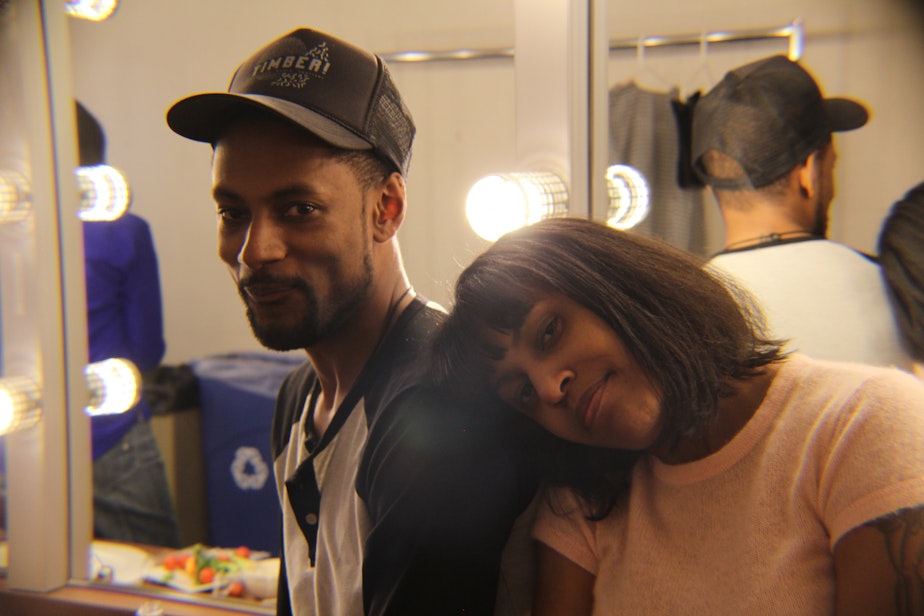Seattle's independent music scene limps along, barely. Will it survive the winter?

2020 was going to be a big year for The Black Tones.
The band fronted by Seattle twins Cedric and Eva Walker planned a big tour in support of their debut recording, “Cobain and Cornbread,” inspired by the intersection of their Louisiana heritage and their Northwest upbringing.
“We were supposed do a lot of traveling,” says Eva Walker, the band’s guitarist and lead singer. “Including South by Southwest, our first time there.”
But the coronavirus pandemic put their dreams on hold, as it did for so many in Seattle’s music industry.
When Governor Jay Inslee put social gathering restrictions in place last March, the result was the closure of dozens of local nightclubs, and the immediate cancellation of more than 2,000 shows. Eight months later, with another virus surge, the music sector has no idea when it can reopen for live shows. Many worry it won’t be able to survive the pandemic intact.
Local club owner Denise Burnside vividly remembers her first reaction to the public gathering restrictions.
“Are you effing kidding me?”
Sponsored
Two years ago, Burnside and a partner opened the Clock-Out Lounge on south Beacon Hill, presenting local and touring musicians for a mainly neighborhood clientele.
“We had to close down and lay everybody off,” she says.
But Burnside counts herself among the fortunate club owners.
Clock-Out has a restaurant license, and once King County businesses were cleared for partial reopening in June, the club started serving a takeout menu. But Burnside says they’re only bringing in about 10% of the revenue they had at the beginning of the year.
Like so many small business owners, Burnside has limped along with the help of a federal loan and small grants. A recent survey by the Washington Nightlife and Music Association found that at least 60% of state nightclub owners don’t believe they can hang on past February without a significant infusion of cash. Most of those venues are in King County.
Sponsored
The pandemic is eviscerating a once-thriving multi-billion dollar local industry.
Which is why Cedric and Eva Walker have signed on as advisors to an ambitious new fundraising campaign. Keep Music Live looks to raise more than $10 million for local artists and venues, according to Cedric Walker.
“We’ve been trying to raise money privately,” he says, “but now we want to get the fans involved.”
Fans like Dow Constantine, the King County executive, who allocated almost $1 million dollars in his latest county budget proposal for the beleaguered music industry. While Constantine acknowledges the sector’s financial contributions, he says that’s not the only reason he took the unprecedented step of recommending emergency public funding for nightclubs.
“Yes, it employs people and generates tax revenue and all of that,” Constantine says, “but it provides an experience we don’t get other ways. That may sound flowery, but it’s a fact.”
Sponsored
Constantine has fond memories of Seattle’s lively club scene in the mid- 1990’s. Venues like the Crocodile Club , the OK Hotel, the Comet Tavern and many more, some of them still in existence, helped propel the success of Nirvana, Alice in Chains and Soundgarden. But the Seattle sound sound that drew thousands of aspiring musicians and fans to the area transcended “grunge.”
Everyone from Sir Mix-A-Lot to Sleater-Kinney got a boost from Seattle clubs; record labels like Sub Pop had global reach and helped transform the city from a remote working-class aerospace hub to the hippest place in the world.
And that transformation has contributed to the industry’s current problems. According to Constantine, local artists have been in a bind for several years due to the hot real estate market. Even though clubs have been shuttered for eight months, many are still paying tens of thousands of dollars in monthly rent.
“If a club goes out and a landlord has to look around for a new tenant,” Constantine asks, “are they going to try to find another club operating on a shoestring?”
Meanwhile, local musicians who depended on the clubs for their livelihoods have been trying to hang on to expensive apartments and rehearsal rooms. Nobody has kept a tally, but everyone has stories of friends who’ve relocated.
Sponsored

The Walker twins are fortunate to have day jobs that pay the bills, but they’re trying to maintain some of their music career’s forward momentum. Cedric Walker compares the impact of the pandemic closures to the Great Depression.
“Just like the stock market crash, wham!” he says.
The Black Tones have been doing some live streamed shows online, but Eva Walker says it’s a little bit like performing in a void. Plus, it’s not financially viable in the long run.
Sponsored
“When you fill up a venue with 1,000 people, maybe 2,000 at the Showbox, it’s a nice payday, right?” Walker says. “With these virtual things, you get maybe 30 people streaming in, you’re getting some donations, but it’s not sustainable.”
Plus, both Walker twins say, beyond the pandemic, the political climate in this election season, plus the racial justice uprising, have blunted their creative impulses.
“My creative brain is like, ‘let’s just go in survival mode right now,’” says Eva Walker.
Like so many artists, she hopes the people who’ve turned to music, movies and other online offerings will recognize the valuable role culture plays in times of crisis.
For King County Executive Dow Constantine, the arts have always been more than a frill. He wants lawmakers and business people to understand they’re as essential to our well-being as groceries and Amazon deliveries.
“It’s not a ‘nice-to-have,’ it’s a ‘must-have’,” Constantine says. “Economically and culturally.”




